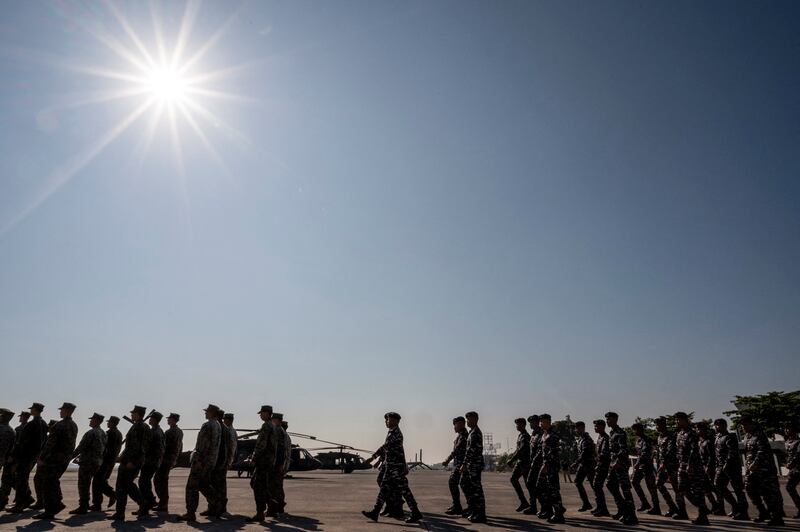Forces from Indonesia and the U.S. are taking part in annual Super Garuda Shield military exercises on the island of Java along with contingents from eight other counties, as the United States looks to limit China’s influence in the region and Indonesia seeks to bolster its alliances.
Altogether, 5,500 troops from the 10 countries are participating while 12 other countries, mostly in the Asia-Pacific region, have sent observers to the war games in Sidoarjo, East Java province, according to the U.S. Indo-Pacific Command.

The U.S. and Indonesia signed a new defense cooperation agreement in November 2023 as Washington looked to counter Beijing's influence across the region. The Pentagon said Super Garuda Shield would help in "solidifying the U.S.-Indonesia major defense partnership and supporting a free and open Indo-Pacific."
The Indonesian military said the exercise, which runs from Aug. 26 to Sept. 6, serves as a platform for building trust and confidence among participating militaries.
“Super Garuda Shield in 2024 is a means to create and build mutual trust in the military sector, strengthen bilateral military-to-military relations, and multilateral relations,” said Air Marshal Widyargo Ikoputra, deputy commander of the Indonesian National Armed Forces Education and Training Command.
RELATED STORIES
[ US and Indonesia begin largest ever 'Garuda Shield' military exerciseOpens in new window ]
[ Indonesia hosts largest military drills with US, allies amid superpower tensionsOpens in new window ]
A U.S. contingent of 2,500 service members is joining approximately 3,000 troops from Indonesia, Australia, Canada, France, Japan, Singapore, South Korea, the United Kingdom, and New Zealand.
Observers from Malaysia and the Philippines, which both have territorial disputes with China over areas of the South china Sea, will be monitoring the exercise, as will representatives from Thailand,
Super Garuda Shield aims to enhance the ability to plan and execute joint operations, improve interoperability between Indonesian and U.S. forces, and foster cooperation across all domains, including land, sea, air, and cyberspace, Indonesia said.
The 2024 drills will include a cyber exercise to prepare the militaries for cyber threats. Indonesia has experienced severe cyberattacks in the past few years, which disrupted several government services.
"Indonesia benefits from this joint exercise as it provides an opportunity to increase defense capacity,” Khairul Fahmi, a military observer from the Institute for Security and Strategic Studies, told BenarNews, an affiliate of Radio Free Asia.
At the same time, Indonesia is playing a crucial role in maintaining neutrality and preventing escalation in the region, Fahmi said.
Policy of non-alignment
Another analyst, Abdul Rahman Yaacob, a research fellow at the Lowy Institute in Sydney, said that while Super Garuda Shield showed a deeper defense engagement with the U.S., Indonesia was also seeking to foster ties with different partners.
During a visit to Australia by Indonesia's incoming president, Prabowo Subianto, the two sides announced that they had finalized a "historic" treaty-level joint defense agreement that would allow more ambitious joint military exercises, according to Australian media.
This week, Indonesian Army Chief of Staff Gen. Maruli Simanjuntak said in an interview with Japan's Nikkei that a joint exercise with China might also start next year.
“Indonesia’s strategic culture is to emphasize non-alignment in dealings with major powers, maintaining defense engagements with various partners, and avoiding military alliances,” Yaacob said.
“Every ASEAN country has their own dynamics,” the analyst told RFA, referring to the 10-member Association of Southeast Asian nations.
However, Yaacob warned that Indonesia must be cautious in advancing defense ties with China in order to avoid misunderstanding by not only the U.S. and its allies but also with Indonesia’s neighbors who are involved in disputes with China over territorial claims in the South China Sea.
The Garuda Shield exercise began in 2006 as an information and training exchange between the U.S. and Indonesia.
Edited by Mike Firn.
Eko Widianto in Malang, Java, and Ahmad Syamsudin in Jakarta contributed to the story.
BenarNews is an RFA-affiliated online news organization.
